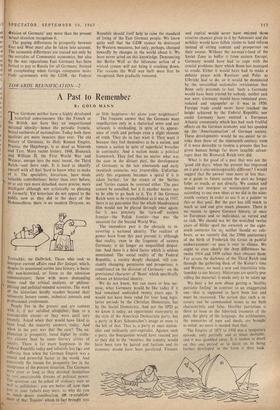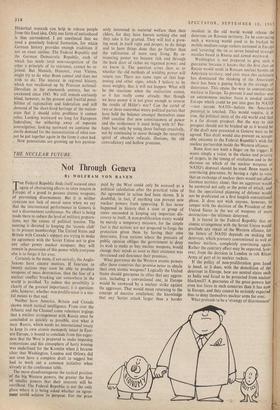TOWARDS REUNIFICATION - 2
A Past to Remember
By Gal° MANN r-
tt n.
q.
al 01
oi01 iii
vi as pl 1-1
Germans neither have a highly developed 1. historical consciousness like the French or te British, nor have they an unquestioned ational identity--hence the periodic frenetic, rutal outbursts of nationalism. Today both these ualities are more insecure than ever. The old istory of Germany, its Holy Roman Empire, russia, the Hapsburgs, is as dead as Nineveh rid Tyre. More recent history, 1848, Bismarck rid William II, the First World War and feimar, merges into the most recent, the Third eich—and there ends. It is hard to identify aeself with all that, hard to know what to make it. The specialists, historians, have made linable contributions; better than ever before, r at any rate more detached, more precise, more Itelligent although not artistically so pleasing ; formerly. Yet historians do not appeal to the ablie now as they did in the days of the ohenzollern; there is no modern Droysen, no
T, in dt al Cc ta of
Ur
Pr Wi Cc re, WI Pli a r so Fe so ti Co Z1C to T1- we Yo SO
reitschke, no Delbriick. Those who seek to terpret current affairs read Der Spiegel, which, :spite its occasional sorties into history, is basic- ly non-historical, or listen to the television immentators; those with more demanding stes read the critical analysts, or philoso- iising and political-minded scientists. The work the historians hardly reaches beyond their riversity lecture rooms, technical journals and ofessional conferences.
People live in the present and are content itn it; if not satisfied altogether, then to a insiderable extent—or they were until very eently, Asked when they would have liked to ve lived, the majority answers, today. And len in the past was that the case? The ex- -illation is prosperity, rated higher by ordin- Y citizens than by some literary critics of ciety. There is far more happiness in the .deral Republic today and infinitely less filar and [tering than when the German Empire was a and powerful factor in the world. And nversely the reason for prosperity lies in the eeptance of the present situation. The Germans !re poor as long as they devoted themselves vast unattainable dreams of political power. ke question can be asked of ordinary men as 'II as politicians: you are better off now than U or your fathers ever; were, so why do you much desire reunification, tin re-establish- int of that 'Empire' which in fact brought you
so little happiness—let alone your neighbours?
The frequent answer that the Germans want reunification only in a rhetorical sense and not seriously is misleading, in spite of its appear- ance of truth and perhaps even a slight element of truth. They do in fact want it. They want it because they feel themselves to be a nation, and remain a nation in spite of superficial breaches in continuity. And a nation needs a political framework. They feel that no matter what was the case in the distant past, the development of Germany, in the late nineteenth and early twentieth centuries was irreversible. Unfortun- ately this argument becomes a spiral if it is taken further; for the events of the 'thirties and 'forties cannot be reversed either. The past cannot be annulled, but it is another matter not to be able to go back to it. Yet if the German Reich were to be re-established as it was in 1937, there is no guarantee that the whole bloodstained film would not be played through once again; for it was precisely the 'torn-off' eastern frontier—the Polish frontier—that was the occasion for the Second World War.
The immediate past is the obstacle to re- covering a national identity. The realities of power born from this past prevent it; although that reality, even in the fragment of eastern Germany, is no longer an unqualified despot- ism. And there is a third factor which is seldom mentioned. The social reality of the Federal Republic, a society deeply changed, still con- stantly changing, permissive and prosperous, is conditional on the division of Germany—on the provisional character of 'Bonn' which specifically refuses an historical identity.
We do not know, but can more or less sur- mise, what Germany would be like today if it had remained undivided twenty years ago. It would not have been ruled for four long legis- lative periods by the Christian Democrats, but by the Social Democrats. And not the SPD as we know it today, an opportunist mass-party in .the style of the American Democratic party, but a party in Kurt Schumacher's image or even to the left of that. That is, a party at once nation- alist and militantly anti-capitalist. Against such a party the bourgeoisie would have reacted just as they did in the 'twenties; the country would have been torn by hatred and factions and its economy would have been paralysed. Finance and capital would never have enjoyed those creative chances given to. it by Adenauer and the
nobility would have fallen victim to land reform instead of sitting content and prosperous on their estates. Without the no-man's-land of the Soviet Zone to buffer it from eastern Europe, Germany would have had to cope with the crucial problems there which Bonn has managed
to evade. Either it would have had to make a
definite peace with Russians and Poles as Ulbricht had to do, or it would be dominated by the unsatisfied nationalist revisionism that Bonn only pretends to feel. Such a Germany would have been trusted by nobody, neither east nor west. Germany would have remained poor, isolated and unpopular as it was in 1930. Foreign trade could never have reached the height achieved by the Federal Republic, nor could Germany have entered a European Atlantic community which has had such fruitful effects on the German economy and has speeded up the 'Americanisation' of German society. These developments would be no easier to re- voke than those of the nineteenth century, even if it were desirable to reverse a process that has given human beings far more tangible advan- tages than the Bismarck Reich ever did.
What is the good of a past that was not the 'good old days,' when the present has improved on it and is also unrecognisably different? I would suggest that the answer runs more or less thus: as a guide to future action the past no longer helps us much, or not directly. We cannot and should not interpret or misinterpret the past according to our own ideas as we did in the nine, teenth century in order to use it as a pointer to this or that goal. But the past has still much to teach us and can give much pleasure. There is no reason to ignore German history, at once so European and so individual, so varied and so rich. We should not let the wretched twelve years of Hitler spoil the sixteenth or the eight- eenth centuries for us; neither should we cele- brate, as we recently aid, the 250th anniversary of the birth of 'Frederick the Great in painful embarrassment—or pass it over in silence. We ought to state clearly the deep differences be- tween 1914 and 1939 rather than obscure them. For across the darkness of the Third Reich and through the gathering dusk of the Kaiser's time and Weimar, we need a new and inquisitive rela- tionship to our history. Historians are quietly pro- viding the material; it needs only .to be taken up.
We hear a lot now about getting a 'healthy patriotic feeling' in contrast to an exaggerated one—that is supposed to have been lost and must be recovered. The notion that such a re- covery can be commanded seems to me both characteristic and false. Healthy patriotism is there as soon as the inherited treasures of the past, the glory of the language, the architecture, the memories of men and deeds, are brought to mind; no more is needed than that.
The Empire of 1871 to 1938 was a temporary episode, only partially and at times desirable, and it was gambled away. It is useless to dwell on this one period or to insist on its being further developed in the form it then took. Historical research can help to release people from this fixed idea. Only one form of nationhood is thus surrendered. I am convinced that we need a genuinely federal formation, for which German history provides enough traditions if not an exact outline. The Federal Republic and the German Democratic Republic, each •of which has made total non-recognition of the other a principle of its existence, cannot be re- joined. But Munich, Hanover, even Vienna, might try to do what Bonn cannot arid does not wish to do. The interest in regional history, which was swallowed up by Prussian national- liberalism in the nineteenth century, has re- awakened since 1945. We still remain .curiously blind, however, to the present and fruitful possi- bilities of regionalism and federalism and still demand of the short-lived heritage of the nation- state that it should solve problems it cannot solve. Looking westward we long for European federalism, the withering away of separate sovereignties; looking eastward we continue the sterile demand for the reconstitution of what can- not be put together again in the form it once had.
New generations are growing up less passion-
ately interested in material welfare than their elders, for they have known nothing else and they take it for granted. They will feel a grow- ing need, in itself right and proper, to do things and to have things done that go further than the cultivation of mere easy living. By re- nouncing power we became rich and through the back door of riches we regained power; and we know it. The question arises then as to whether the old methods of wielding power will return too. There are some signs of that hap- pening and other signs, which I believe to be more weighty, that it will not happen What will be the reactions when the realisation comes, as it has really come already, that though we have power it is not great enough to reverse the results of Hitler's war? Can the cartel of two or three somewhat weary political parties that have held the balance amongst. themselves since 1949 canalise that new consciousness of power and the restlessness it must bring with it? Per- haps; but only by using those feelings creatively,
• not by continuing to move through the recurring spiral of obsolete refusals, illusions, the old contradictory and hollow promises.



































 Previous page
Previous page